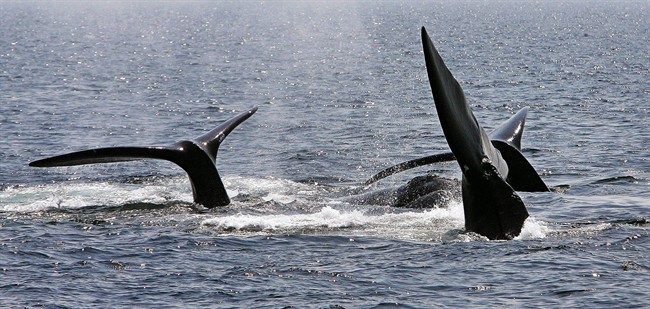Marine transportation operator Oceanex is advising its clients it is raising its fees temporarily on service between Montreal and Newfoundland as a result of recent federal government regulations to protect North Atlantic right whales.

The Newfoundland firm says a four per cent surcharge will be issued on future invoices related to movement of goods between the two Atlantic cities.
Over the past few months the carcasses of at least 13 right whales have turned up, 10 of which have been in the Gulf of St. Lawrence.
READ MORE: Right whale deaths: Feds order ships to slow down to prevent deaths
With about 500 of the endangered species left in the world, according to fisheries officials, the federal government was prompted to take action.
Last week, Transport Minister Marc Garneau announced ships of 20 metres or more will be required to slow to 10 knots — or about 19 kilometres per hour — while travelling in the western Gulf of St. Lawrence. This means ships in the area of the Quebec north shore to just north of Prince Edward Island will be required to slow down or be subject to a financial penalty of up to $25,000.
Smaller ships are also being asked to follow the speed limit but on a voluntary basis. The measure will be lifted once the whales migrate from the areas of the gulf that currently pose the most concern.
As a result, Oceanex says in a release that its ships will need to travel at faster speeds when outside of the protection zone. But an increase in speed will see more fuel consumption and increasing labour costs for loading and discharging cargo, due to modified terminal operating times.
WATCH: Ottawa says it will do what is needed to protect ‘majestic’ right whales

Any clients with concerns about the surcharge have been advised by the firm to contact the government of Canada.
“As a marine transportation operator, Oceanex is cognizant of its responsibility to promote navigation safety and protection of the marine environment,” the notification says. “As such, Oceanex is taking the necessary action to comply with the government order while still providing its customers with reliable transportation solutions. Oceanex has advised the Government of Canada of the significant impact of this temporary regulation and encourages you to raise any of your concerns regarding the issue with your local Federal Government of Canada representative.”
The surcharge will enter into effect starting with the next sailings from St. John’s and Montreal and will be removed once the federal requirement is lifted.
A 13th right whale carcass was found about 160 miles east of Cape Cod by the U.S. Coast Guard on Monday and was reported to the National Oceanic and Atmospheric Administration.
—With files from The Canadian Press




Comments